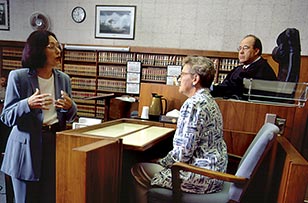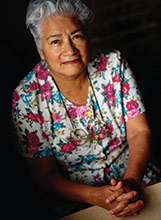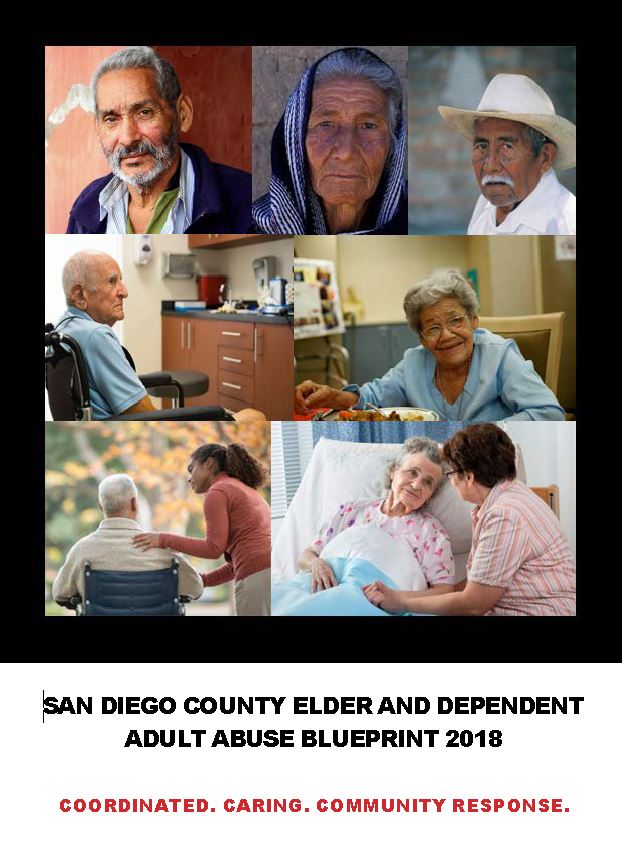Elder Scam Prevention Campaign Materials
The District Attorney’s Office launched a large-scale outreach campaign aimed at educating seniors, their loved ones, caregivers, and the public about the types of scams currently targeting the elderly. San Diego County seniors were scammed out of more than $130 million during a one-year period in various online and phone scams. Our campaign, “Stop. Hang Up. Tell Someone.” delivers a simple, memorable message that helps older adults and caregivers pause, think, and protect themselves from costly scams. Click here to see the materials.

Help Keep San Diego County Seniors Safe
San Diego County handles over 10,000 reports of elder and dependent adult abuse each year. Many other incidents go unreported, leaving vulnerable adults in distressing, potentially life-changing, even dangerous, situations.
Abuse often escalates if there is no intervention. Victims will live in silent desperation, unwilling to seek assistance because they believe their cries for help will go unanswered and they fear retaliation from their abusers. Many remain silent to protect abusive family members from the legal consequences of their crimes, or they are too embarrassed to admit that they have fallen victim to predators.
Reporting Elder and Dependent Adult Abuse
If a situation appears to be life threatening or a crime is in progress, call 9-1-1 or your local law enforcement agencies such as police and Sheriff's departments. Some agencies have specialized units that focus on crimes involving elder and dependent adults. If you believe elder or dependent abuse has occurred, call Adult Protective Services at 1-800-339-4661, 24 hours a day, 7 days a week.
Warning Signs of Elder Abuse
Prosecuting Elder Abuse
The Importance of Reporting Elder Abuse
Reporting Abuse in Licensed Facilities
The "Grandma Scam"
Ten Tips to Help Your Reduce The Risk of Becoming The Next Victim of Financial Elder Abuse
Tips for Hiring an In-home Caregiver
Financial Advice
Warning Signs of Elder Abuse [Back to Top]
Physical Abuse
- Obvious lacerations, abrasions, fractures, welts, bruises, discoloration, or swelling
- Pain or tenderness on mere touch
- Burns caused by cigarettes, ropes or other bonds
- Elder is withdrawn or demonstrates dramatic change in behavior
- Fear, Confusion or Withdrawal
- Appears depressed and not himself/herself
- Unusual mood changes and anger
- Fear of being touched or approached by others
- Seems withdrawn, unusually introverted or afraid
Financial Abuse, taking funds, property or assets by
- Theft
- Burglary
- Forgery
- Fraud
- Scams - By phone, mail, or internet.
- False Lotteries
- For allegations of real estate fraud, please click here.
Neglect
- Abandonment
- Abduction
- The elder feels isolated by a caretaker and is unable to speak freely or spend time with others
- A caretaker fails to assist with personal hygiene or in providing clothing for the elder
- A caregiver has a history of violence, alcohol or drug abuse
- The elder has sudden weight loss or shows signs of dehydration or malnutrition
- The elder does not have necessities, including eyeglasses, dentures, prostheses, hearing aids, canes, walkers, or other critical items
Self Neglect, inability of an elder or dependent adult to:
- Provide personal care
- Obtain food, water, medical care, medications
- Maintain personal safety
Self-neglect is NOT a crime. However, seniors can receive assistance from Adult Protective Services.
Often victims of elder abuse can be abused in more ways than one. For example, an abuser may hit the elder (physical abuse) in order to convince him or her to turn over money to the abuser (financial abuse).
If any of these conditions apply, please call Adult Protective Services at 1-800-339-4661 immediately to report it.
Prosecuting Elder Abuse [Back to Top]
The DA's Elder Abuse Unit, which is part of our Family Protection Division, is ready to help.
In addition to prosecuting crimes against seniors, the District Attorney's Elder Abuse Unit
addresses the special needs of elderly and dependent victims, who often require hands-on care and attention.
Education is also part of our mission. We meet with seniors to teach them how to protect
themselves. We train bank and credit union employees how to protect the financial assets of
their elderly customers. We also train police, public safety and fire personnel to be aware
of the special issues involving elders.
If you believe elder abuse has occurred, call Adult Protective Services at 1-800-339-4661 immediately to report it.
Importance of Reporting Elder and Dependent Adult Abuse [Back to Top]
Anyone who has even the slightest suspicion that an elder or dependent adult is a potential
victim of abuse is asked to report their concerns. When in doubt, err on the side of caution
 and report. The law does not require non-mandated reporters to make abuse reports. However, to
encourage reporting, all reports are confidential and non-mandated reporters are not required
to give their names. They are also protected from civil and criminal liability if they make the
report of elder abuse in good faith.
and report. The law does not require non-mandated reporters to make abuse reports. However, to
encourage reporting, all reports are confidential and non-mandated reporters are not required
to give their names. They are also protected from civil and criminal liability if they make the
report of elder abuse in good faith.
For Information on Mandated Reporters please click here.
Mandated reporters, such as health and social service professionals, are able to report suspected elder or dependent adult abuse online through the following URL:
https://www.sandiegocounty.gov/content/sdc/hhsa/programs/ais/ais-online-referrals.html
Users of the online system will need to register when they first use the link and the County Aging & Independence Services will need to approve the account.
Online users will not need to call in an initial report or send a follow-up written report.
Mandated reporters who choose NOT to use the online referral are required to report any suspicions of abuse by telephone immediately and file a written report -- the SOC 341 form -- within 48 hours. Individuals who willfully fail to report where the abuse results in death or great bodily injury, may be punished by up to one year in county jail, or by a fine of up to $5,000, or by both imprisonment and fine.
Mail to:
Aging & Independence Services
County of San Diego, HHSA
P.O. Box 23217
San Diego, CA 92193-3217
Fax to: (619) 344-8077
Adult Protective Services (APS), a division of the County's Aging & Independence Services, is the designated agency to accept reports of suspected abuse of elders and dependent adults who live in private homes, apartments, or hotels, or in facilities when the alleged abuser is not a resident or staff member.
APS is responsible both for investigating reported cases of elder and vulnerable adult abuse and for providing victims with treatment and protective services.
APS can be a lifeline for dependent adults and seniors who have been harmed or are threatened with harm:
- Adults 18+ with a physical or mental disability that prevents them from taking care of themselves
- Seniors 65 and older
Please read more about how the APS system works.

Facility Elder Abuse
Please click here for information about reporting Elder and Dependent Adult Abuse in licensed nursing, residential, and board and care facilities.
The "Grandma Scam" [Back to Top]
The DA's Victim Assistance Division has noted an apparent increase in crime reports where elderly citizens have been targeted by criminals using the so-called “Grandma Scam.” Imposters, often from foreign countries, target the elderly by posing as a grandchild in trouble and in need of cash. The caller often says that he or she has been arrested, was in a car accident or has some type of medical emergency. The caller always insists that the grandparent not tell anyone about the money transfer, which is one of the red flags. The scam is often effective because it catches seniors off guard and tugs at their heartstrings. Victims of financial elder abuse lose an estimated $2.9 billion nationwide, according to a study released by the MetLife Mature Market Institute. Most victims are between the ages of 80 and 90, live alone and require some level of help with healthcare or home maintenance.
Fight back by ensuring that your friends and family members do not become victims. Explain to them how the scam works, and encourage them to be suspicious of anyone who calls unexpectedly and wants them to wire money- especially to Mexico and Canada. The San Diego County Office of Aging and Independent Services has an Adult Protective Services hotline for those who suspect any type of elder abuse. The phone number is 800-339-4661.
To keep your finances safe from scams, consider these tips: sweepstakes and overseas lotteries are phony; screen your calls before answering; don’t be afraid to hang up on the perpetrator; don't let emotions cause you to react immediately to a phone call, letter or email; always check with a professional adviser. When people have been scammed once, their phone numbers and information are sold to other tricksters. Consider changing your phone number to avoid an onslaught of predatory phone calls.
Ten Tips to Help Your Reduce The Risk of Becoming The Next Victim of Financial Elder Abuse [Back to Top]
Please read these tips to avoid elder abuse.
Tips for Hiring an In-home Caregiver [Back to Top]
Although you can never totally guarantee that your elder family member won’t be at risk with a caregiver in the home, there are ways to minimize that potential problem. Please read these tips to avoid elder abuse.
Financial Advice [Back to Top]
Seniors who are seeking assistance from a financial expert can visit the nonprofit H.E.L.P. (Healthcare and Elder Law Programs)
website which includes an Ask First questionnaire to use to select an financial advisor.
Please read more about Protecting Mom & Dad's money
One of the tasks of the federal Consumer Financial Protection Bureau (CFPB) is to help educate older adults about how to avoid being victims of financial abuse. The bureau recently created two objective and useful publications. One is a consumer guide to reverse mortgages. The other is a “Money Smart” curriculum regarding scams and fraud against older adults. To locate these publications and future ones, visit the website and look under “Consumer Education.” You can call the bureau at (855)-411-2372.


